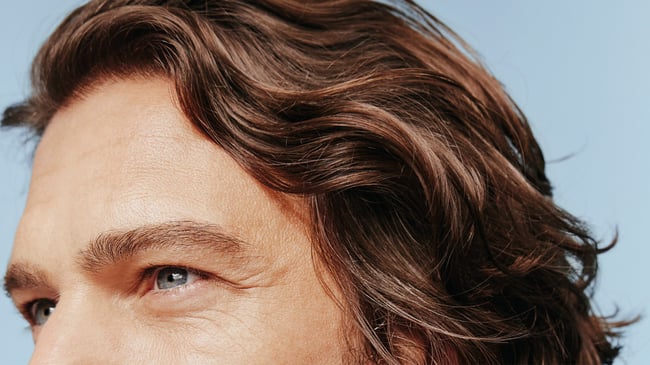

Our top tips for keeping your shoulders tidy.
Dandruff on your shoulders clashes with, well, pretty much anything you might want to wear. It's pretty logical, then, that you’ll want to get rid of dandruff. But first let’s dive into what causes it before we can guide you towards a dandruff-free life.
So, what is dandruff?
Let's start with the basics: simply put, dandruff is dead skin that results from your scalp renewing itself overly quickly or enthusiastically. It’s very common, and isn’t a major symptom of anything else, it’s more of a cosmetic problem.
Dandruff is divided into two types: dry dandruff, which is more common, and oily dandruff, which is generally down to excess sebum, aka greasy hair. Oily dandruff is the most dangerous for hair because it suffocates the roots and can accelerate hair loss. Either way, both cause itching and can trigger psoriasis. And nobody likes scratching their head.
If dandruff is persistent, you could be suffering from seborrhoeic dermatitis. It’s always best to consult a dermatologist, who will be able to recommend effective treatments to combat this condition. Stress is an aggravating factor, but seawater can help soothe an inflamed scalp. Any excuse for a holiday…
But what causes dandruff?
There are several causes. Some are within your control, while others are unfortunately the result of bad luck or environmental factors.
As with many skin conditions, a poor diet that’s too oily, sugary or salty will encourage the appearance of dandruff and alter the quality of your skin’s sebum secretions, which are essential for the scalp. Stress is both a trigger and an aggravating factor of dandruff, as is heavy alcohol consumption: so watch out when you’re responding to a stressful day with a few too many glasses of your favorite whisky. By regulating your diet and your alcohol consumption, and trying to regulate your stress levels as best you can, you can limit these effects. In short, a healthier lifestyle is great for your scalp.
Overly aggressive hair treatments, such as a hairdryers that are too hot or shampoos that are too harsh, can also contribute to the development of dandruff. The same applies to wearing your favorite hat every day: it's important to let your hair breathe.
Climate and pollution can also aggravate dandruff problems, particularly those caused by seborrhoeic dermatitis. Cold, damp weather, for example, encourages the development of flaky skin. Dandruff can also be caused by hereditary factors. If a close member of your family has dandruff, this may well mean you’re more susceptible.
OK, got it. How do you get rid of dandruff?
Now for the good news. By taking a few simple steps you can get rid of dandruff and even prevent it from appearing in the first place.
Use an anti-dandruff shampoo
A good anti-dandruff shampoo will, as the name suggests, get rid of dandruff. Our Anti-Dandruff Shampoo for men, for example, contains active ingredients that are particularly good at dealing with dandruff. For example, piroctone olamine acts on flakes and itching thanks to its antifungal effects, Simple, effective.
Nourish and moisturize your scalp
Dealing with dry dandruff requires hydration. An effective anti-dandruff treatment needs to include scalp moisturization, so after you use an anti-dandruff shampoo, follow with a strengthening conditioner that contains moisturizing ingredients. We have 2 for you to choose from, depending on your hair type. For hair that tends to get greasy or oily, Normal to Oily Hair Conditioner contains kokum and shea butters, two super-nourishing ingredients that’ll do just that for your scalp. To deeply nourish dry hair, our Dry to Very Dry Hair Conditioner is the one for you. With both shea and mango butter, it’s specifically formulated to repair and strengthen hair while providing protection.